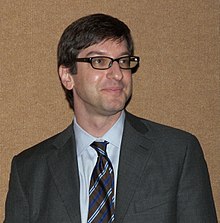
Summary
David Isaac Laibson (born June 26, 1966) is an American economist and professor at Harvard University, where he has taught since 1994. His research focuses on macroeconomics, intertemporal choice, behavioral economics, and neuroeconomics. In 2016, he became chairman of the Harvard economics department.
David Laibson | |
|---|---|
 David Laibson in 2007 | |
| Born | June 26, 1966 |
| Nationality | American |
| Education | Harvard University (BA) London School of Economics (MSc) Massachusetts Institute of Technology (PhD) |
| Academic career | |
| Institution | Harvard University |
| Field | Macroeconomics Behavioral economics |
| Doctoral advisor | Olivier Jean Blanchard[1] Roland Bénabou[1] |
| Influences | Benjamin M. Friedman Matthew Rabin |
| Information at IDEAS / RePEc | |
Life and career edit
Laibson was raised by Ruth and Peter Laibson in Haverford, Pennsylvania. He received an AB (summa) from Harvard in 1988, studying under Benjamin M. Friedman, and went on to win a Marshall Scholarship to study at the London School of Economics (MSc in Econometrics and Mathematical Economics). He received his PhD from MIT in 1994 and joined the faculty at Harvard once he graduated. He has since gained tenure. He is married to the mathematician Nina Zipser, and they have a son, Max.
At Harvard, he teaches Economics 2030: Psychology and Economics. He also co-teaches Economics 10, the year-long introductory economics class at Harvard, together with Jason Furman.[2] His research has been published in prestigious journals such as the QJE, AER, JEP, Econometrica, and Science.
References edit
- ^ a b Laibson, David Isaac (1994). Hyperbolic Discounting and Consumption (PDF) (Ph.D.). MIT. Retrieved February 1, 2017.
- ^ Armenakas, Sophia S.; McCafferty, Molly C. (April 1, 2019). "Laibson and Furman to Take Over Ec10, Increase Number of Lectures | News | The Harvard Crimson". The Harvard Crimson.
External links edit
- The Psychology of Savings and Investment, a series of three talks by David Laibson at the London School of Economics and Political Science, Nov 19–21, 2007.


